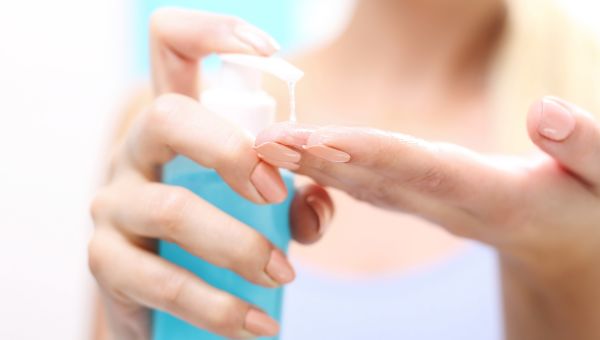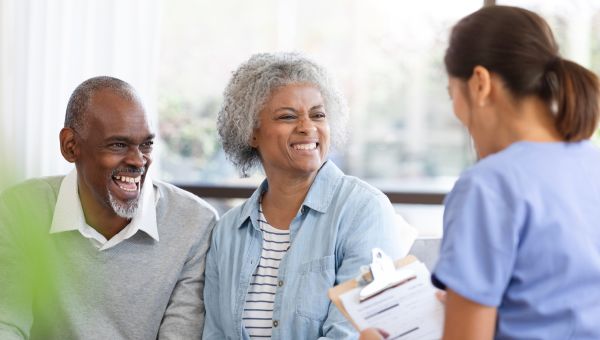How to have satisfying sex during menopause
There’s no age limit to physical pleasure.
Updated on April 19, 2024

Menopause brings about a lot of changes, both to your lifestyle and your body. Some of these can make your sex life even hotter: You know what you want in life and you may no longer have to worry about birth control after your period has stopped completely for 12 consecutive months. But some of the physical changes may pose more of a challenge. For example, vaginal dryness and reduced elasticity can make sex painful and hot flashes and night sweats may not exactly put you in the mood.
These changes are common. In fact, between one-third and one-half of perimenopausal and postmenopausal people have some type of sexual concern, according to the North American Menopause Society.
But plenty of people in menopause find ways to deal with these issues and even make their sex lives better as they age. A national poll conducted by the University of Michigan in 2018 found that 69 percent of female respondents (all of whom were over age 65) said sex was an important part of a romantic relationship and 43 percent said they were extremely or very satisfied with their sex lives.
There are many ways to treat the symptoms of menopause, which begins on average at age 51. Hormonal and nonhormonal therapies, a healthy lifestyle, and some simple, sex-specific tweaks can help keep the fire alive.

Maintain an active, healthy lifestyle
During menopause, eating a well-balanced diet and getting plenty of physical activity won’t just power your body—it can help fuel your sex life.
Because we tend to move less as we get older, it’s very common to gain weight during menopause. A few extra pounds aren’t harmful, but it’s important to keep a healthy body weight. Aim for a diet rich in fruits, veggies, whole grains, low-fat dairy, and lean protein, and shoot for at least 30 minutes of moderate-intensity physical activity at least five days per week. Walking is an effective way to stay active and lose weight.
You can log your meals and physical activity with Sharecare, a free app for iOS and Android. The app can help you note patterns and find areas for improvement.

Consider using lube
Estrogen production decreases during menopause. This can lead to vaginal dryness and thinning of the vaginal walls, which can make sex less comfortable. One fix for this issue is lubrication (or lube).
These days, there are many different types of lubes—ranging from jellies to liquids, cooling to warming, short-term to long-lasting. Try experimenting with different products to find the one that works best for you and your partner.
There’s no wrong way to apply lube. It can be spread directly around your vaginal area, on the penis, or even on a condom. Start with one or two drops and see how it goes. Experiment first with a little lube to make sure you don’t have an allergy. If you experience redness, dryness, swelling, or other irritating symptoms, stop using the lube or try hypoallergenic options.
Many people going through menopause find that regular use of over-the-counter (OTC) vaginal moisturizers eases dryness, as well. Neither lube nor OTC moisturizers contain hormones, so they won’t affect the elasticity or thickness of your vaginal walls. You can also talk to a healthcare provider (HCP) about prescription therapies that can help manage vaginal dryness. These may include pills you take by mouth or creams containing hormones that you apply to your vagina.

Lean into clitorial stimulation
In general, direct clitoral stimulation is a good way to have more orgasms—no matter how old you are. That is even more true as you go through the menopause transition.
“Most older people are more likely to have clitoral-stimulated orgasms versus vaginal-penetrative orgasms, so they may need a little help getting to the 'top of the mountain,'” says Samantha Tojino, a nurse practitioner and sexual health expert with Augusta Anti-Aging Medicine in Evans, Georgia.
The clitoris isn’t just the glans, or external nub of skin, but extends into the labia (vaginal lips). Internally, it’s shaped like an upside-down wishbone. Your partner can use their mouth, hands, sex toys, and genitals to stimulate its different areas. Exploring can help you both understand what feels good to you.

Get adventurous
When Tojino talks with her menopausal patients—or any patients for that matter—she always recommends they try new things in the bedroom. One of her go-to ideas is what she calls the “fantasy box.”
Here’s how it works: At the start of each week or month, write down different fantasies or role-playing scenarios that you and your partner agree you want to try. Then, fold the papers up and place them in a box. In the morning, randomly select one. That way, you can plan and anticipate the fantasy throughout the day.
Here are some concepts you could put in your fantasy box:
- Try a new sexual position (check out The Joy of Sex or the Kama Sutra for inspiration).
- Have sex in the kitchen or on the living room couch.
- Devise a role-playing scenario you’d both be interested in trying. (Strangers meeting on a train? The Queen and her bodyguard?)
Don’t forget toys. Introducing a stimulation device can help you climax sooner. You and your partner should discuss the types of toys that make you both feel good. A trip to the sex shop can be fun, but if you’re uncomfortable with that, you can make purchases online.

Show some love throughout the day
It can be easier to increase anticipation for sex when you’ve been playing with the idea throughout the day. Tojino suggests connecting with your partner by:
- Pulling your fantasy box card out together each morning
- Holding hands
- Kissing each other goodbye in the morning
- Having lunch together if you work close by
- Leaving a sexy love note in your partner’s jacket pocket
- Sending each other sexy texts in the middle of the day

Bring your partner along to your healthcare visits
Your partner may better understand your physical, mental, and emotional challenges if they accompany you to a gynecologist visit, says Tojino.
“When I'm doing a vulvoscopy, or vulva examination, my patient’s partners can see everything and they’re also able to hear my conversation about atrophy or pH balance. They really start to understand that this is a real condition,” says Tojino. If your partner is hesitant, remind them that going with you is meant to improve your sex life—and your overall relationship.
It’s also important to remember that menopause brings many mental and physical changes. So if you need some time away from sex, that’s okay. There are other ways to achieve intimacy besides intercourse. If your partner understands what’s going on from the beginning, you two can have a successful conversation about taking a break or trying new things.

Take Note Of Any Unusual Symptoms
While things like vaginal dryness, night sweats, and decreased libido can be typical changes during menopause, there are some symptoms that could indicate a more serious underlying health condition. Tojino says to see an HCP if you notice any of the following:
- Vaginal bleeding related to sexual activity and/or after the menopause transition
- Blood in your urine
- Pelvic pain
- Pain with urination
- Vaginal discharge that’s not clear
“It’s good to be proactive and address sexual health issues,” says Tojino, who suggests seeking out a medical professional who specializes in sexual and menopausal health. Not only will they help you come up with a treatment plan, they can act as a sounding board as you go through this natural transition.

The North American Menopause Society. Sexual Problems and Activity by the Numbers. Page accessed June 22, 2022.
The North American Menopause Society. Ask the Sexperts: 6 Suggestions for Superior Sex. Page accessed April 19, 2024.
University of Michigan. Let’s Talk About Sex. May 2018. Page accessed June 22, 2022.
The North American Menopause Society. Frequently Asked Questions. 2022. Accessed June 22, 2022.
Esfahani SB, Pal S. Obesity, mental health, and sexual dysfunction: A critical review. Health Psychol Open. 2018;5(2):2055102918786867. Published 2018 Jul 12.
The Cleveland Clinic. Clitoris. Last reviewed April 25, 2022. Accessed June 22, 2022.
The North American Menopause Society. Decreased Desire. 2022. Accessed June 22, 2022.
Office on Women’s Health. Menopause and Menopause Treatment. February 22, 2021. Accessed June 22, 2022.
Wallen K & Lloyd EA. Female sexual arousal: genital anatomy and orgasm in intercourse. Hormones and Behavior. May 2011. 59(5), 780–792.
Cleveland Clinic. Dysuria (Painful Urination). December 8, 2020. Accessed June 22, 2022.
NIH: National Institute on Aging. Sex and Menopause: Treatment for Symptoms. September 30, 2021. Accessed June 24, 2022.
Cleveland Clinic. Estradiol Vaginal Cream. Accessed April 19. 2024.
More On


video

article

slideshow


video


video
